8 best cloud hosting providers
Cloud hosting offers scalability, flexibility, and enhanced site performance, letting you scale resources on demand while reducing single-point failures. It delivers steadier performance during traffic spikes and makes growth easier.
Cloud hosting is a better long-term choice if you expect growth, variable traffic, or stricter uptime requirements. In this article, we will explore the top 8 cloud hosting platforms:
- Hostinger – best for growing small to medium sites that want fast performance, simple management, and clear value.
- SiteGround – best for WordPress-focused projects that want premium support and built-in speed tools.
- DreamHost – best for pay-as-you-go cloud and low-cost object storage for straightforward workloads.
- DigitalOcean – best for developers who want simple VMs, clean docs, and predictable scaling.
- Vultr – best for broad global locations and flexible, low-cost instances.
- Akamai Cloud – best for developer teams that want dedicated CPU options and API-first automation.
AWS – best for complex architectures, enterprise features, and strict compliance needs. - Google Cloud Platform – best for data-heavy websites that benefit from Google’s ecosystem.
We’ll compare their pricing, features, and who each one is best suited for – so by the end of the article, you’ll know which provider fits your project’s needs.
1. Hostinger
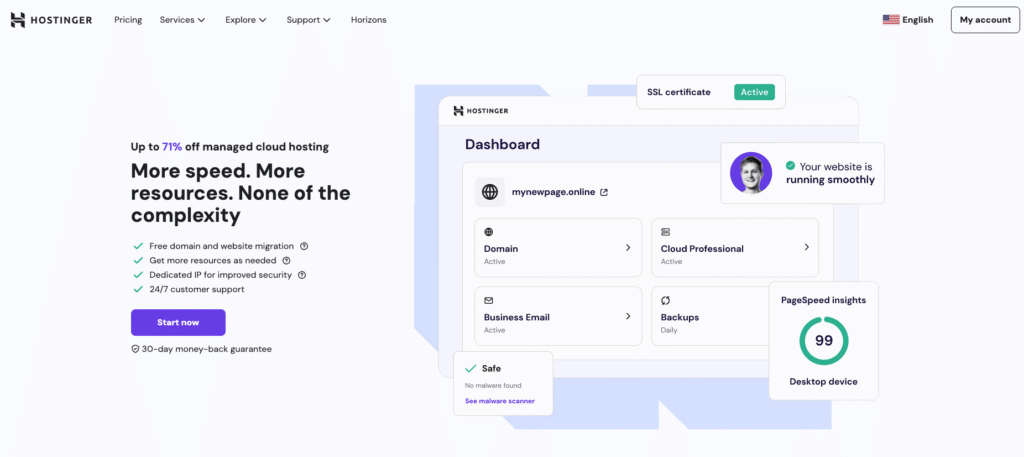
Best for: Small to medium-sized websites, startups, and businesses
Price: Starting at $7.99/month
Hostinger stands out as the best cloud hosting provider for numerous reasons, making it an excellent choice for small to medium-sized websites, startups, and businesses.
Our cloud plans are based on scalability. As your website grows and requires more dedicated resources, you can easily upgrade your cloud hosting plan without any downtime. This scalability, alongside our global cloud data centers, ensures that your website can handle increased traffic and adapt to changing demands.
You also get high-performance servers and SSD storage to guarantee fast page loading times, improving user experience and search engine rankings. With our robust infrastructure, your website performs optimally, even during peak traffic periods.
Security is also a top priority for us. We have implemented advanced security measures, including a free SSL certificate, firewalls, and regular cloud backups, to protect your data and keep your website safe from cyber threats.
Managing your cloud hosting environment is also made easy with Hostinger’s user-friendly control panel hPanel. Whether you are setting up your free domain, managing email accounts, or installing applications, hPanel’s intuitive interface allows you to efficiently manage your cloud hosting plan without any advanced technical knowledge.
Additionally, Hostinger provides exceptional live chat customer support around the clock. Our knowledgeable Customer Success team is ready to assist you with any technical issues or questions you may have.
Whether you’re an online business or a growing startup, Hostinger offers the reliability and features needed to host your website in the cloud and succeed online. Thanks to the scalability, high-performance servers, advanced security measures, user-friendly control panel, and excellent customer support, your website can handle anything.
Key Features:
- Scalable cloud hosting solutions to accommodate website growth
- High-performance servers and NVMe storage for fast loading times
- 99.9% server uptime guarantee
- Advanced cloud security measures, including a free SSL certificate, to protect your data
- User-friendly control panel for easy management
- Excellent customer support available 24/7

2. SiteGround
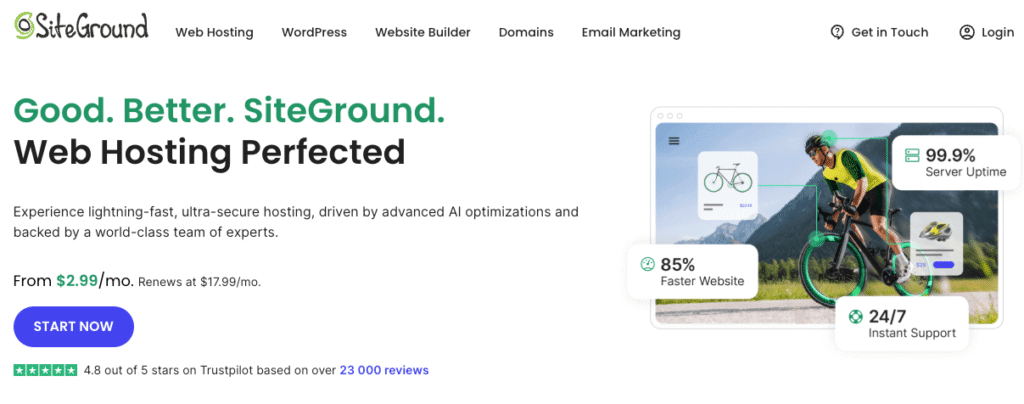
Best for: Small to medium-sized businesses, WordPress websites, and developers
Price: Starting at $100/month
SiteGround’s cloud hosting services are particularly well-suited for small to medium-sized businesses, WordPress websites, and developers. While the price point may be higher than other cloud providers, the robust features and performance make it a worthwhile investment for resource-heavy projects.
One of the standout features of SiteGround’s cloud hosting service is its advanced caching technology. Your website will load fast, resulting in happier site visitors and better chances of ranking higher on search engines.
SiteGround also offers a user-friendly control panel that simplifies the management of your cloud hosting environment. Even if you’re not an experienced developer, navigating the interface and performing necessary maintenance tasks is relatively easy.
SiteGround provides 24/7 customer support, ensuring that any technical issues or queries are promptly addressed. This is particularly valuable for businesses that rely on their websites for critical operations, like online stores.
Unlike many other providers, SiteGround’s cloud hosting service is considerably more expensive than the market average, making it less accessible for budget-conscious individuals or small businesses. Additionally, SiteGround’s data center locations are somewhat limited, which can affect server latency for users in certain regions.
Key Features:
- Scalable resources to accommodate website growth
- Advanced caching technology for fast loading times
- User-friendly control panel for easy management
- Excellent customer support with 24/7 availability
- Enhanced security measures for data protection
3. DreamHost
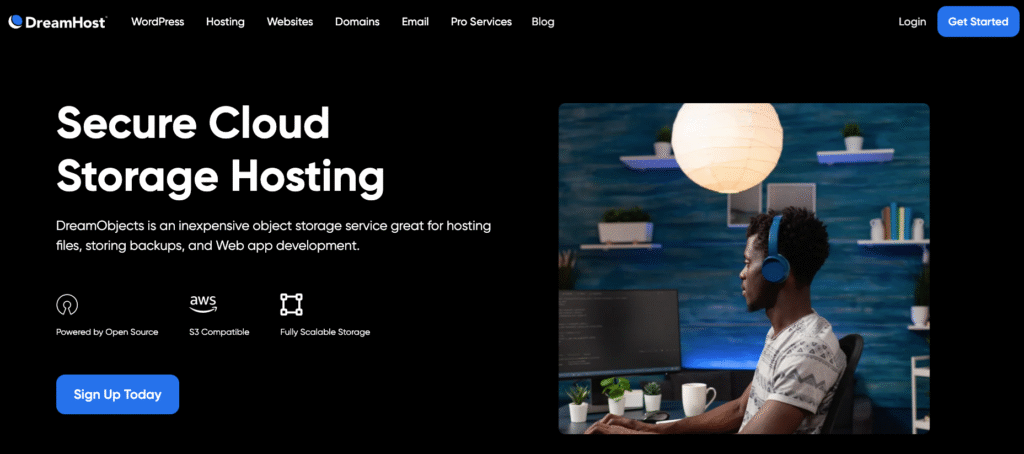
Best for: Bloggers, small businesses, and individuals seeking affordable cloud storage
Price: Based on usage
DreamHost offers a range of cloud hosting plans suitable for bloggers, small businesses, and individuals. Scalable cloud hosting services provide the necessary resources to accommodate the growth of your website. In contrast, the DreamObjects cloud storage offers an affordable storage solution similar to Dropbox or Google Drive.
One feature that sets DreamHost apart from other hosting providers is the brand’s commitment to privacy and data protection. They prioritize the security of your data and provide transparent policies to ensure your information remains safe.
Similar to Hostinger, DreamHost also offers a custom control panel, making managing your cloud hosting environment easier. Their affordable storage solution, DreamObjects, provides scalability and flexibility in managing your data. With options to expand storage capacity as needed, you can store and retrieve files efficiently without breaking the bank.
Unlike many other cloud hosting providers, DreamHost’s pricing isn’t as transparent as other brands. In fact, the usage-based pricing might make it harder for beginners to estimate how much their hosting service will cost each month.
DreamHost’s cloud hosting plans may also not offer as many advanced features or developer-oriented tools as some competitors, making it a less ideal option for seasoned developers. Additionally, it’s important to note that DreamHost’s cloud hosting plans may not be as suitable for high-traffic or resource-intensive websites.
Key Features:
- Cloud hosting services that scale with your website
- Affordable cloud storage solution with DreamObjects
- Custom control panel for easy management
- SSD storage for enhanced cloud server performance
- Strong commitment to privacy and data protection
4. DigitalOcean
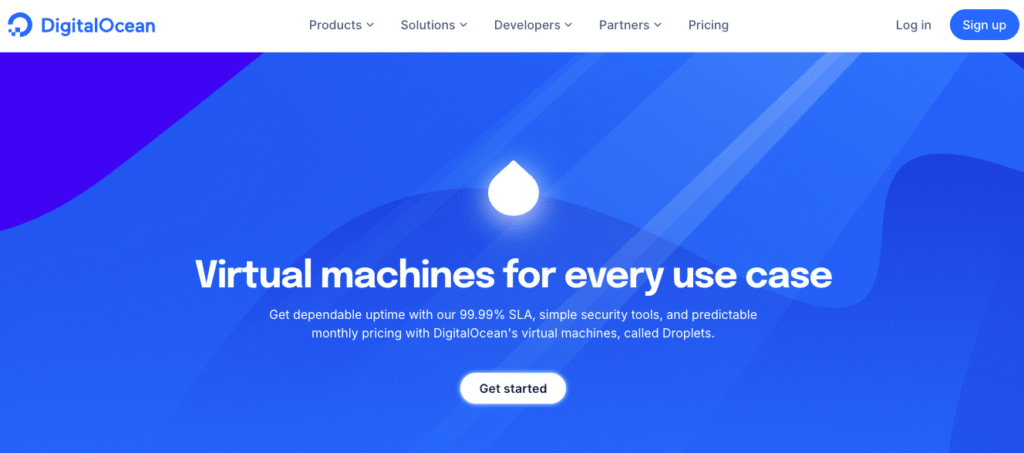
Best for: Developers, startups, and businesses requiring scalable cloud infrastructure
Price: Starting at $4/month
DigitalOcean is a web host known for its developer-centric approach and scalable infrastructure. Their cloud virtual machines (VMs) or “droplets” make it easy to scale resources, adapting your web hosting to the needs of your website or application. With a focus on simplicity and user experience, DigitalOcean provides a straightforward and intuitive web hosting environment for developers.
The platform offers extensive documentation and a supportive community, making it an ideal choice for developers seeking to grow their skillset and collaborate with others. DigitalOcean’s global network of data centers also ensures low latency and high availability, ensuring optimal performance for your cloud-hosted applications.
Unfortunately, due to the developer-oriented nature of DigitalOcean’s cloud hosting packages, you will need a certain level of technical expertise to fully utilize all the features. Additionally, compared to the best cloud hosting providers, DigitalOcean doesn’t have as many pre-configured application stacks or managed cloud hosting services available.
Key Features:
- Scalable “droplets” (cloud VMs) for flexible resource allocation
- Developer-friendly environment with extensive documentation and community support
- Global network of data centers for optimal performance and availability
- Simplified server management with user-friendly control panel and robust API
5. Vultr
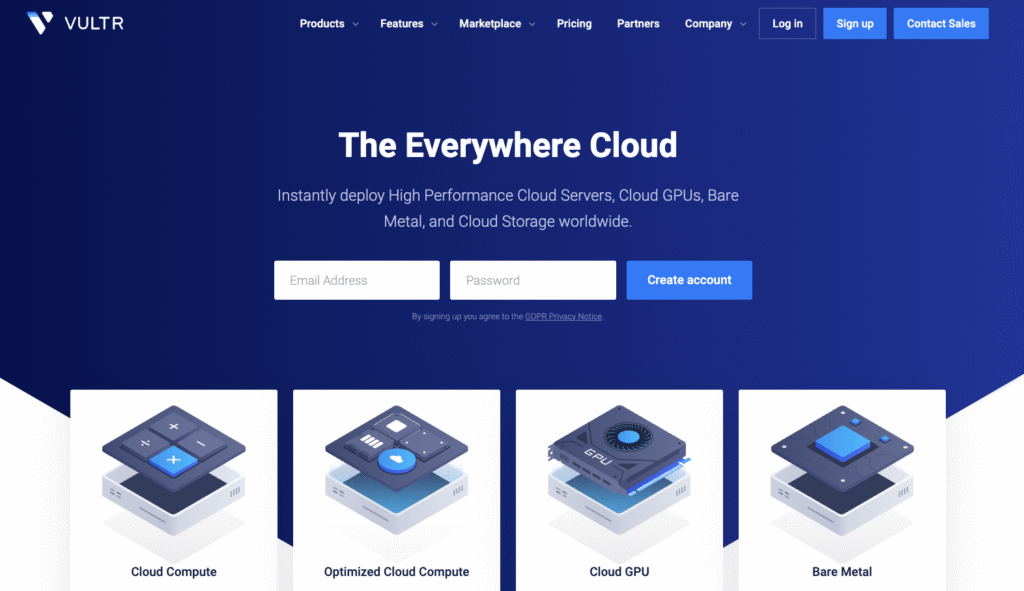
Best for: Developers, businesses, and individuals in need of scalable cloud hosting
Price: Starting at $2.50/month
Key Features:
- Scalable compute instances for flexible resource allocation
- Global network of cloud servers for optimized performance
- Flexible pricing with pay-as-you-go and monthly plans
Looking for a robust cloud hosting service? Vultr is a web host that offers high-performance cloud web hosting and dedicated server hosting. Their scalable compute instances allow you to adjust resources according to your requirements, providing flexibility while being cost-effective.
Vultr’s global network of data centers ensures low latency and high availability, enabling optimal application performance and a great user experience for site visitors. Whether you need a cloud server in North America, Europe, Asia, or other regions, Vultr provides multiple servers and locations to choose from.
Vultr has both pay-as-you-go and monthly plans available, making it a popular web hosting solution for developers, businesses, and individuals looking for a cost-effective and flexible hosting solution.
The robust infrastructure and flexible pricing come at a cost. Users need certain technical knowledge to fully utilize Vultur’s services. Vultr’s customer support is also limited, primarily focusing on infrastructure-related issues.
6. Akamai Cloud
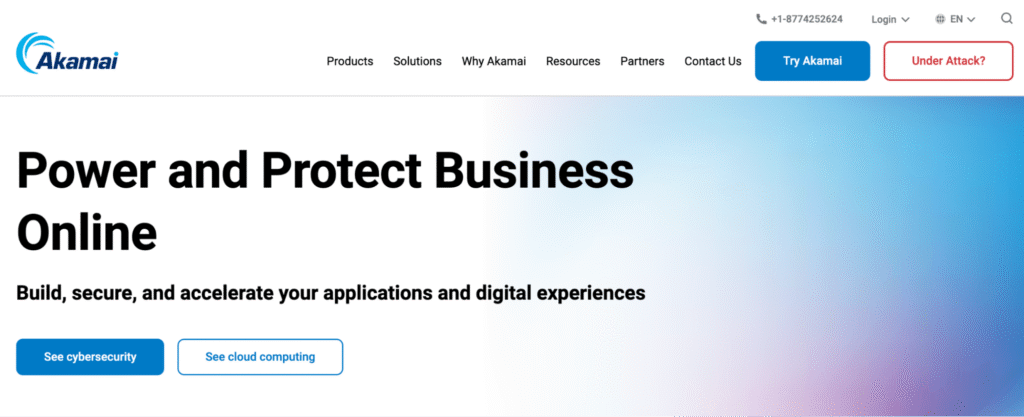
Best for: Developers, businesses, and resource-intensive workloads
Price: Starting at $5/month
Akamai is a web hosting company catering to developers, businesses, and projects that require substantial resources. Their standard and high-memory web hosting plans are flexible, accommodating various application and project requirements.
Akamai’s dedicated CPU options provide consistent performance for resource-intensive projects, ensuring smooth operation even under heavy loads. This feature is particularly beneficial for applications that require consistent computing power and stable cloud servers.
The APIs make Akamai popular for developers seeking web hosting with seamless automation, integration, and customization. Akamai’s APIs enable developers to programmatically control their infrastructure and streamline workflows.
While Akamai provides a robust web hosting infrastructure, beginners should expect a rather steep learning curve. Akamai’s customer support is also primarily infrastructure-focused, meaning that you need to understand how cloud computing works to get the most out of your cloud server.
Key Features:
- Standard and high-memory hosting services for diverse workload requirements
- Dedicated CPU options for consistent performance
- Powerful APIs for seamless automation and integration
7. AWS (Amazon Web Services)
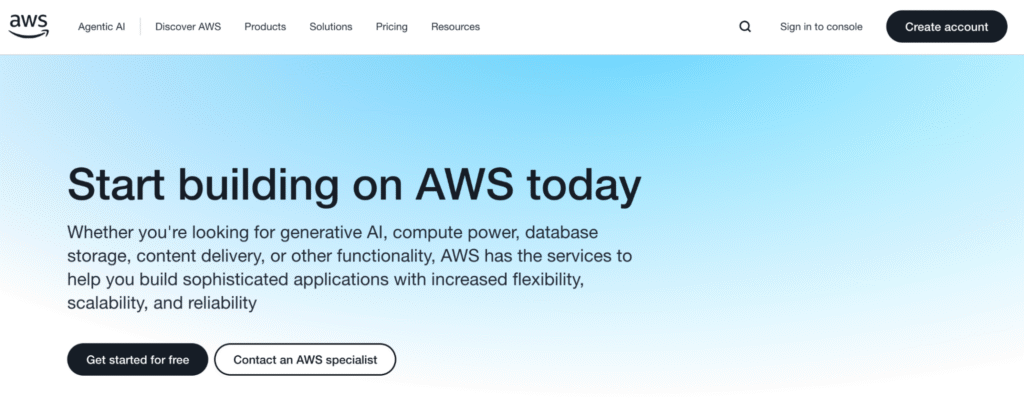
Best for: Enterprises, large-scale websites, and complex applications
Price: Pay-as-you-go pricing model, varies based on services and usage
AWS, Amazon’s cloud computing platform, offers cloud hosting features mainly for enterprises, large-scale websites, and businesses with complex infrastructure requirements. With an extensive range of cloud solutions, AWS covers everything from storage, computing power, databases, analytics, and more.
Scalability is a core strength of AWS, allowing businesses to dynamically adjust resources to match fluctuating demands. With a flexible infrastructure and multiple availability zones, AWS ensures high uptime and resilience for mission-critical applications.
AWS takes security seriously, and users get advanced features such as encryption, access control, and comprehensive compliance certifications. AWS adheres to strict security practices, making it a trusted choice for organizations with sensitive data and regulatory requirements.
With a global network of data centers, AWS offers low-latency connections and optimal performance across different regions. On top of this, the overall AWS ecosystem makes seamless integration with various services and tools easy, giving users flexibility and customization options.
While AWS is a powerful and feature-rich platform, it’s not the first choice for users with little technical expertise. Compared to other cloud hosting options, AWS isn’t as easy to navigate and manage compared to other providers. Additionally, the pay-as-you-go pricing model means costs can vary based on usage and specific services utilized.
Key Features:
- Extensive range of cloud services for diverse needs
- Scalable infrastructure with high availability and redundancy
- Advanced security measures and compliance certifications
- Global network of data centers for optimal performance
- Robust ecosystem and integration capabilities
8. Google Cloud Platform (GCP)
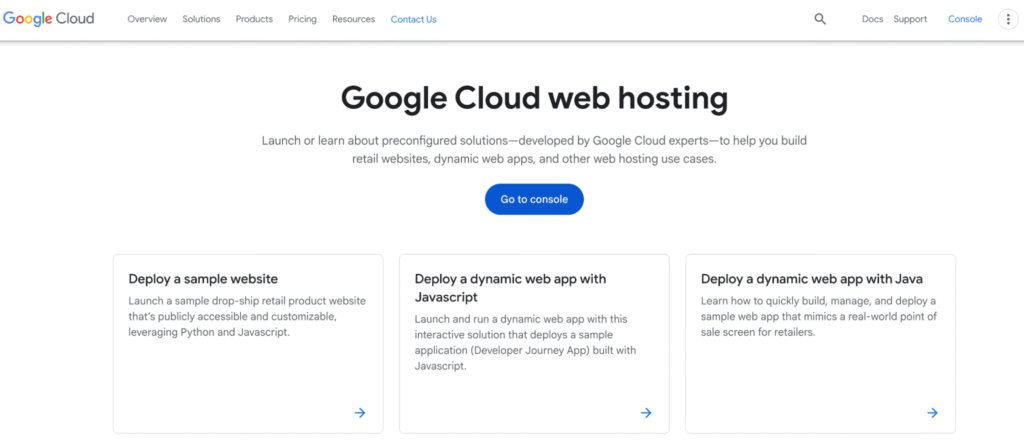
Best for: Businesses of all sizes, machine learning applications, and data-intensive projects
Price: Varies based on services and usage
Google Cloud Platform (GCP) offers a wide range of cloud services tailored to businesses of all sizes, including startups, enterprises, and organizations with data-intensive workloads.
GCP’s scalable infrastructure, powered by Google’s global network of multiple servers, ensures high-performance connectivity and low-latency connections across regions. You can easily scale resources based on your site’s demands, ensuring top performance regardless of traffic spikes.
Advanced features like data encryption, identity and access management, and compliance certifications make GCP great for projects requiring robust server and site security. The platform also provides a secure foundation for hosting sensitive data and applications, offering peace of mind to businesses with strict security requirements.
The data analytics and big data processing capabilities of GCP make it easy for businesses to extract valuable insights from large datasets. With services like BigQuery and Dataflow, organizations can efficiently process and analyze data for informed decision-making.
As part of the Google ecosystem, GCP is easily integrated with other Google services, such as Google Workspace and Google Maps, providing a cohesive environment for businesses using multiple Google tools.
One major downside of GCP is its steep learning curve. Pricing also varies based on usage and specific services employed, meaning you need to know what resources your site needs for optimal performance.
Key Features:
- A comprehensive suite of cloud services, including AI and machine learning tools
- Scalable infrastructure with a global network and low-latency connections
- Advanced security features and compliance certifications
- Data analytics and big data processing capabilities
- Easy integration with other Google services
How to choose the right cloud hosting provider
Choosing the right cloud web host is crucial in establishing a reliable and high-performing online presence. To ensure you make the best decision for your website’s needs, consider the following steps:
- Define your workload – List your stack, typical load, and peak traffic patterns. Note performance targets and any must-have features.
- Set budget – Decide a monthly range and a hard ceiling for spikes. Include hidden costs such as bandwidth, storage growth, backups, and IPs.
- Shortlist 3–4 candidates – Filter by region availability, support level, and migration help. Keep only providers that meet your non-negotiables.
- Compare like-for-like plans – Match vCPU type, RAM, NVMe storage, and transfer allowances across providers. Align terms (monthly vs 1-4 years) so pricing is apples-to-apples.
- Validate performance with a pilot – Spin up a small instance and run quick load and latency tests. Measure before/after against your targets, not generic benchmarks.
- Assess support quality – Open a test ticket and check response speed and depth. Review knowledge base quality and escalation paths for urgent issues.
- Plan migration and rollback – Prepare backups, staging, and a DNS cutover plan with low TTL. Define a rollback path if metrics dip after go-live.
- Decide on commitment length – Start monthly to learn, then commit longer if the fit is right. Confirm upgrade/downgrade paths so you can scale without friction.
Next steps: deploying your website on a cloud hosting
Now that you’ve compared providers, the path to launch is straightforward. Start by confirming your basics – what you’re hosting, expected traffic, and your monthly budget. Pick a cloud plan with a little headroom for growth, choose your data center region, and create your account. Use the provider’s guided setup to spin up your site, then personalize your theme and core pages so everything looks and reads right.
Connect your domain, add an SSL certificate, and preview your site before going live. When you’re ready, publish and keep an eye on performance and costs during the first week. Set automated backups, add a CDN if your audience is global, and revisit your plan as traffic grows – scaling up on cloud is quick and low-friction.
If you want the easiest path, Hostinger’s cloud hosting makes launching feel simple. Guided steps in hPanel help you set security defaults, manage your hosting, and install WordPress with a click. Features like free SSL, daily backups, and staging environment remove extra setup work. With 24/7 support and a clean dashboard, you can publish fast, refine content, and focus on growing your site – not managing servers.

All of the tutorial content on this website is subject to Hostinger's rigorous editorial standards and values.


